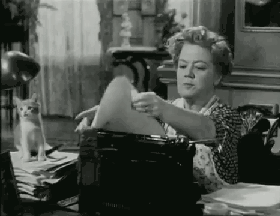As students, we’re constantly wondering what exactly professors want. As the semester speeds on and assignments pile up (and up and up), we believe they may just want our tears. Or a ritual sacrifice.
But on the horizon now is this horrific hybrid-monster thing professors try to pass off as an easy alternative to a timed exam. Fasten your seatbelts, kids, because this one’s no joke. If you’re looking to succeed on this last hurdle into your stress-free summer, take a second look at your work because the rules have changed.
Welcome to the take-home final.
1. Take baby steps

You aren’t going to like this one. The first step takes place in class, way before finals period (You’re unhappy. See, I told you). The problem is your professor knows you can do the grunt work; what they really want to see is how you can put it all together. For Kevin Ohi, an English professor at Boston College, it isn’t just about having great study skills or a killer memory. “The question is how to move from dutifully fulfilling expectations to having thoughts,” Ohi said. Apparently, professors are looking for dazzling, original thoughts from us. Yikes.
2. Put pen to paper, or hand to keyboard

You better be ready to rewrite, too. For Susan Roberts, an English professor at Boston College, there’s one single golden word when it comes to big final assignments: “revision.” You’ve probably heard it before, but have you ever actually listened? Professor Roberts said, “You have to give yourself enough lead time to make a good end product.” So get ready to whip out not one, not two, but many drafts of that final assignment.
3. Watch out for your mortal enemy, time

All those revisions require a few extra weeks and—newsflash—your professors know if something is rushed. Professor Roberts warns against procrastination. “Three hours of writing looks like three hours of writing. 10 hours of writing looks like 10 hours of writing. It does make a difference,” she said. You can’t fool them! Professors always, always know. They have a sixth sense for laziness.
4. Be selfish with your professors

Do you think your professor’s office is just there to hold all their books? Professors are here for students. Even weirder, they’re not here as a resource just because they’re paid to do so; they actually enjoy it. “We aren’t here to tell you you’re wrong, we’re here to help you form your own thinking,” Professor Roberts said. What they want out of these last big assignments is exactly that: your own thinking. And trust me, they understand that’s a tough task, so go suck them dry for all the help they can give.
5. Stop right there: turn the B.S. off and the brain on

If you feel like you’re going in the wrong direction, you probably are. Instead of stumbling on, ask for some guidance before it’s too late. Jeffrey Bloechl, a philosophy professor at Boston College, said this is one of the biggest mistakes he finds students make. “Sometimes a student gets… outside the range of the assignment, but does not ask me for help until they have already wasted a lot of time.” Professors want to talk about all your ideas, the good and the bad. Especially the ugly—and yes, that take-home exam may very well be ugly.
6. Give them a “transformation Tuesday”

It’s not a sprint, it’s a marathon: remind yourself of this when you’re looking at your cumulative grade for that cursed microeconomics class. “I ask my students to show me where they were, and where they’ve gone,” Professor Roberts said. “It’s not just a summary of all the thing you’ve been told, it’s about what you’ve learned.” This is your time to show off. Make it clear in that take-home exam that you’ve changed for the better.
7. Put your “self” forward—no, not the best one

It’s the “you” in the piece that matters. And guess what? It doesn’t have to be professional class-time you speaking. Why not let the version of you that keeps 57 Buzzfeed tabs open but never washes the dishes have free range? “I don’t mind students who are wild or undisciplined or scattered as long as I can sense a genuine engagement with the texts I have presented to them,” Ohi said. Bring your real, genuine self and your own authentic ideas to your take-home exams, and (surprisingly) you won’t scare your professors away. You might even impress them.
8. Don’t hand in something that’s already yawning

You have to have a good grasp on the basics, of course, but a key element is getting creative with those basics. “If the work is not only carefully researched and clearly written—these being minimum expectations—but also somehow original or creative, this does stand out,” Bloechl said. So try writing your take-home final on Ulysses in a stream of consciousness style, or try your hand at a mock-Platonic dialogue for your philosophy final. It can’t hurt to be different.
9. Try “crazy” or “barely acceptable” for your topic

Similarly, nothing is more boring than reading 35 take-home finals about the theme of the American dream in The Great Gatsby. Ditch those tired prompts and write something on a topic you’re afraid your professor will hate. “You have to be willing to say or write things that, in the cold light of morning, you will deeply regret,” Professor Ohi said. Hey, if you really care about what you’re doing, then have no regrets. Good grades? Who needs ‘em.
10. Be a little bad

Ohi’s advice? Ignore the things that bore you. “Students need to be encouraged to be bad students—to ignore the classes that bore them and to put wasteful effort into the classes that extort their attention,” Ohi said. So, maybe you shouldn’t exactly ignore classes that bore you—please, at least try to graduate—but really give that extra effort if you’ve found something that makes you feel passionate. The take-home final is the perfect venue for this; you have to pick a topic that you’re going to love writing about for three weeks. Choose wisely.
You still have time left to finish your take-home exams, so make use of it. Make it worth your professor’s while, and yours too. “The adventure of thought that you have pursued is everything,” Ohi said, and that’s true. This can be about so much more than just getting a good grade. Although that will surely happen as a result– I mean, ahem—as a side perk.



















